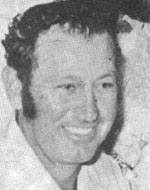Son of Lipa and Shoshana. He was born on March 29, 1932, in Be’er Tuvia. Where he began his studies and completed, and there he built a farm for himself and his family. Moshe was a sleepy, withdrawn child, “but he was very alert to what was happening in nature,” says his older sister, Dvorke. “Children, cats, rabbits and pigeons occupied him more than friends and he spent a lot of time with them, taking care of them and feeding them.” Moshe worked in his parents’ farm from an early age, and “to work in the school garden and to the agriculture classes he devoted himself very seriously,” recalls Talia, the moshav’s daughter. When the War of Independence broke out and the ‘big ones’ were mobilized, the “adult” children (ages 13-14) joined the kibbutz labor. When it comes to “work” Moshe headed, and with regard to social affairs always remained introverted, quiet and not involved. Although he took part in activities in the Hanoar Haoved movement, as an apprentice and counselor, during the War of Independence he served in liaison and defense roles with the rest of the children, but he was always a little distant and reserved for himself his inner, domestic, non-mixed world. “I remember Moshe as a strong, big solid guy,” Talia continues. “No one dared to quarrel with him, even though it was known that he would not take advantage of his physical strength, and Moshe was a gentle boy, with natural, internal courtesy, and everything – good or bad – was received with good spirit. He was very very humble in his modesty and humility, and when he helped others, he did so quietly and with great will. ” Moshe was drafted into the IDF in April 1950 and sent to the IDF’s first “Tankers” course. During his service in the Armored Corps, he served as an artillery and tanker in the Sherman tank. His commanders regarded him as “a good and dedicated crewman,” noting in particular his love for his comrades-in-arms, his army pride and deep sense of belonging to the corps that characterized him. Sergeant Shlomo Saporta: “Moshe was a model soldier with deep inner discipline, and always liked to help the tank crews above and beyond the requirements. multi”. In 1953-1954, the Ministry of Labor mobilized reserve soldiers to work in the new moshavim. This work, as an agricultural guide, Moses did faithfully and devotedly. A few years later Moshe began to suffer from pain in the vertebrae and could no longer drive the tank. “This fact hurt him the most,” said Tony, a moshav member. “He was very upset that he could not have been the hero and the strong, as he was in his childhood.” In 1959 Moshe married Adina, the daughter of the moshav. It was gentle “that he would put on his bicycle with tremendous pride. So, in their youth, Adina was a young wife, and Moshe was already a certified farmer. After many years of friendship, the two married, and they had three sons: Eran – the son, and the two girls – Hila and Reut. Moshe continued to work in his parents’ farm, developed the farm, expanded it, and made room for his young family. “Moshe was very diligent,” recalls Shimshon. “I remember how he explained to me how much he enjoyed his work, and added:” But I do not like to work alone, so I chose the job through which I meet many people, because I love people. ” Indeed, Moshe and Adina’s house was warm and open, and around them a circle of friends was formed. The friends also liked to come to this house, which radiated warmth and Yaffa family relations. Moshe’s children also remember Father as “a man who worked tirelessly.” “My father amazed me every time anew,” says Eran, “in his love of work in the agriculture, in which he invested all his strength, ability and talent.” And Hila says: “The image of Avi embodies the image of Be’er Tuvia, and Avi was a typical earth man.” And Little Reut-Tutti remembers how “I had a special place on the tractor beside DadHis knees, and he held me tight. “Nevertheless, when he finished his day, Moshe took his children to his home, told stories of Tutti, and helped prepare the lessons for the great ones. He had a warm relationship with the soldiers of the unit he belonged to, and from time to time he would host them to the “henning” in the moshav, but the Wynns also adopted homeless soldiers who served in the area. Moshe, who aspires to perfection by nature, has often complained of wrongs, mishaps, and distortions Were made in the small moshav, which he himself did all he did to make the most perfect way: On the 3rd of Adar 5738 (March 12, 1978), Moshe served as a reservist in the Lachish District Command. In the early morning hours, he left for Be’er Tuvia for a short vacation. The vehicle he drove overturned, and Moshe was killed in an accident. He was brought to eternal rest in the cemetery in Beer Tuvia. He was 46 when he fell. He left behind a wife, a son, two daughters, parents and two sisters. In a letter of condolence to the bereaved family, his commander wrote: “Moshe’s comrades-in-arms told him that he was a devoted and responsible person who loved to help everyone in need, and in fact served them as a model. The family published a booklet in his memory, edited by his daughter, Hila.
